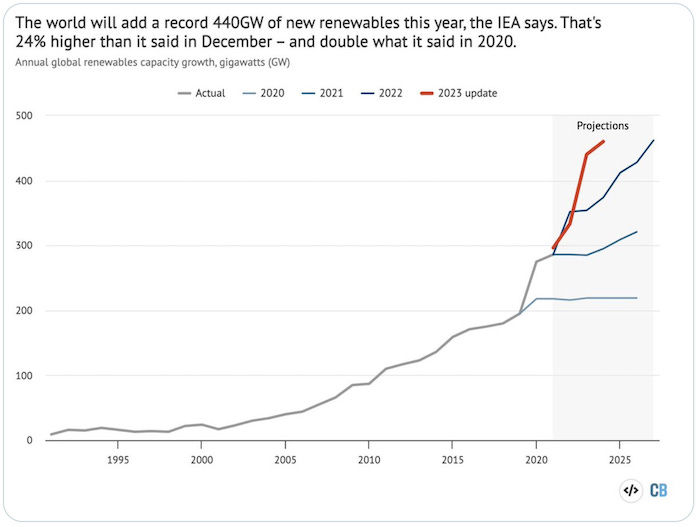THE BIGGEST LOSER: Alberta Election Result Sets Smith's UCP Up for a Fall
On her way to a much-reduced majority, Danielle Smith boxed her government into a set of policies and ideologies that won't confront the province's biggest threat.
Alberta Premier Danielle Smith may have recorded a win last week, in a provincial election where scarcely 1,300 voters in six out of 87 constituencies decided the outcome. But out here in the real world, this was an election that everyone lost.
Like every political party leader anywhere who’s won a tight race in a first-past-the-post system, Smith is framing her province’s closest-ever election result as a “very strong mandate” to govern. And, in her case, to take the fight to the dreaded Liberal government in Ottawa.
But this isn’t a post about first-past-the-post (sorry, Green Party friends).
Beyond the horse race news coverage that dominated the election period and the immediate aftermath, there are no obvious winners in the Alberta vote. But Smith and her United Conservative Party (UCP) team have set themselves up to be the biggest losers of all.
That line of thought begins with a small but important shift in focus, from being committed to one party or the other to being intensely partisan for whatever is essential for the province and its population. Those priorities line up nicely with what the rest of the country needs on climate and emissions policy, and where most of the rest of the world is going on energy investment.
But that’s not the way this election unfolded.
Everyone Loses
Opposition leader Rachel Notley obviously failed in her bid to regain the premier’s chair with a campaign that often seemed determined to out-conservative the conservatives— because that blindingly successful strategy worked so well for Tom Mulcair’s federal New Democrats in 2015. The provincial NDP brain trust evidently missed the memo that voters were ready for a grown-up conversation about climate change, the energy transition, and the jobs and prosperity a provincial government could tap into by embracing the shift off carbon.
The Trudeau government can look forward to a continuing onslaught in response to upcoming policy moves on an oil and gas emissions cap, Clean Electricity Regulations, and sustainable jobs legislation, all of them essential to meeting Canada’s climate targets. On election night, Smith even took a shot at federal efforts to curtail climate pollution from fertilizer overuse, a likely dog whistle to convoy occupation organizers ginning up opposition to a strategy that reduces farmers’ operating costs, gives them a better shot at staying in business—and has been wildly popular in Alberta.
Albertans everywhere can look ahead to four years of missed opportunities in a province where renewable energy development is surging in spite of provincial policy pronouncements and funding priorities, not because of them.
Rural people get a political party dominated by radical right voices that falsely and dangerously claimed the province’s horrific run of early wildfires had been deliberately set to tip the election result. “Take Facebook and throw that damn thing in the garbage,” a frustrated Wade Williams, mayor of Yellowhead County, a UCP stronghold, said last month.
People in Alberta’s fossil-producing regions will have to take their own steps to continue a clean energy jobs transition that two-thirds of oil and gas workers say they want, while elected leaders of both political stripes stoke opposition to the very idea.
And with Smith locked into a never-ending, performative battle with Ottawa, every Canadian will miss out on the faster, smarter federal-provincial cooperation that is crucial to getting the country’s transition off carbon done.
But after all that, Smith’s backward-looking vision of Alberta’s economic future means that she and her United Conservative Party colleagues have the most to lose over the next four years. As climate impacts worsen, as global investment continues to pivot out of fossil fuels, as a mix of urgency and opportunity fuels a faster transition to renewables, and as Alberta misses more and more opportunities…it’s hard to see how the UCP’s wilful disconnect from reality will make them any more popular the next time voters have a chance to weigh in.
Hiding in Plain Sight
It’s easy to second-guess a losing election strategy after the votes have been counted. But this was one instance where the elements of a winning campaign (other than Smith’s, that is) were hiding in plain sight. A national survey conducted last year for our data partner, Vancouver-based EcoAnalytics, showed that Albertans want a transition off carbon just as much as other Canadians.
“Like other Canadians, they want to see action on this issue, now—as they understand the need to move quickly,” EcoA Managing Director Jim Boothroyd wrote for The Energy Mix in January.
The April, 2022 Environics survey found that:
• 71% of Canadians and 69% of Albertans agreed or strongly agreed that Canada should invest now in a transition while helping people and businesses lower energy use and save money.
• 69% of Canadians and 67% of Albertans agreed or strongly agreed that Canada should invest now in a transition because we are already incurring significant costs from extreme weather.
• 67% of Canadians and 64% of Albertans agreed or strongly agreed that Canada should invest now in a transition rather than face higher costs if we have to undertake a faster transition later.
• 68% of Canadians and 71% of Albertans agreed or strongly agreed that governments should help oil and gas workers and their communities make a just transition to new job opportunities in a clean, more sustainable economy. Albertans’ support jumped to 86% when pollsters asked about a “fair” transition instead of a “just” one.
The Voters Know Best
For evidence that those voters are on a smarter track than either provincial party, look no farther than the International Energy Agency’s projection this week that countries will install a stunning 440 gigawatts of new renewable energy capacity this year, or 550 GW in an “accelerated” scenario. “That's 24% more than [the IEA] said just six months ago—and double what it expected in 2020,” noted Carbon Brief Deputy Editor Simon Evans.
Or compare and contrast two major job announcements in the days since Albertans went to the polls. On Wednesday, Greek industrial giant Mytilineos SA unveiled a $1.7-billion, 1.4-GW solar project in Alberta that will be Canada’s largest to date when it goes into service in 2026 or 2027. A day later, oil sands giant Suncor Energy said it was laying off 1,500 staff “to ensure the ongoing competitiveness of our company”.
And yet, based on their positioning during the provincial campaign, there’s scant evidence of either the UCP or the NDP abandoning the myth that Alberta can keep expanding oil and gas extraction in a moment when production and emissions have to decline. And as Smith begins assembling her cabinet, there’s no indication that the UCP will follow their voters’ preferences—or the advice of another Alberta-adjacent icon to “skate where the puck is going”—and get behind the forces for change that are already sweeping the province, like it or not.
It may work for them for days, weeks, or a few months. But over the longer haul, Smith’s radically unrealistic politics will mean four lost years for Alberta while much of the province continues to burn, literally and figuratively. At some point, voters are bound to call them to account.
Mitchell Beer traces his background in renewable energy and energy efficiency back to 1977, in climate change to 1997. Now he and the rest of the Energy Mix team scan 1,200 news headlines a week to pull together The Energy Mix, The Energy Mix Weekender, and our newest weekly e-digest, Cities & Communities.
You can also bookmark our website for the latest news throughout the week.
Graph of the Week

Out-of-Control Wildfire Burns Homes, Forces Evacuations Outside Halifax
Is Equinor’s Bay du Nord ‘Delay’ a Cancellation in Slow Motion?
Analyst Sees Oil and Gas Running Short of Cash as IEA Releases Energy Investment Update
13 Canadian Fossils Linked to Massive Losses in Western Wildfires
Hamilton Plans Heat Bylaw for Rental Housing
House of Commons Motion, Senate Bill Urge New Climate Rules for Financial Institutions
Clean Energy to Add 700,000 New Jobs by 2050, with Alberta in the Lead
Electric School Buses Boost School Attendance, Deliver Emergency Power
Big Polluters’ Share Prices Fall After Climate Lawsuits (The Guardian)
Chinese Solar Exports Grew 64% in 2022 (IEEFA)
Emergency Law Needs to Change for the Climate Crisis Era (Policy Options)
Buffalo Leaders Weren’t Ready for Blizzard That Killed 31 (New York Times)
Electric Car Range Set to Double with First Production of Breakthrough Battery (The Independent)
France's Short-Haul Flight Ban Comes Into Force (Le Monde)
Robust Procurement Practices Support Sustainability Objectives (Acceleration Economy)
U.S. Non-Profit Aims to Reduce Emissions of Super Climate Pollutant (Inside Climate News)
Montreal Ozone Protocol Has Slowed Loss of Arctic Sea Ice (Carbon Brief)
CEO of Biggest Carbon Credit Certifier to Resign after Claims Offsets Worthless (The Guardian)
Global Heating Will Push Billions Outside ‘Human Climate Niche’ (The Guardian)
New Study Raises Alarm over Rapid Global Wildlife Loss (Canadian Broadcasting Corporation)







